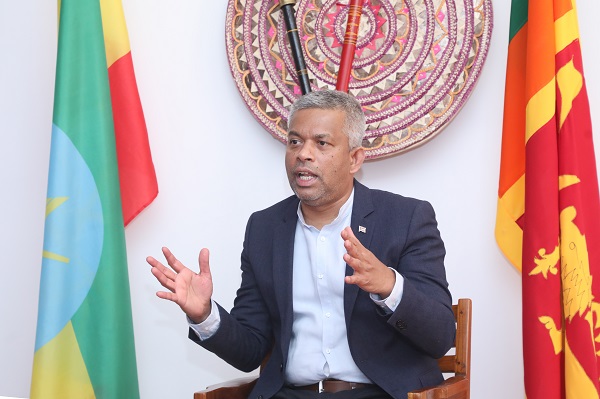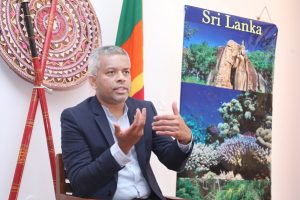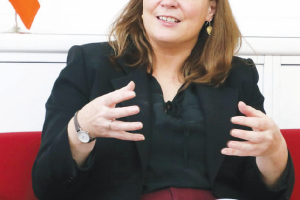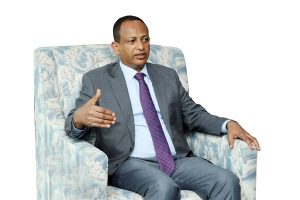
Ethiopia and Sri Lanka have a long history of diplomatic relations. Both countries have maintained a strong bond of friendship and cooperation over the years based on mutual respect and understanding.
The two countries have collaborated on various issues, including trade, education, and culture. They have also supported each other on the international stage, working together to address common challenges and promote peace and stability in their respective regions.
Despite the geographical distance between them, Ethiopia and Sri Lanka have managed to build a strong partnership that benefits both countries. Through regular communication and cooperation, they have been able to strengthen their ties and work towards common goals.
This relationship serves as a prime example of how two nations can come together to create a positive impact on the world stage. Their collaboration is a testament to the power of diplomacy and cooperation in fostering peace and prosperity.
Today’s guest, K.K. Theshantha Kumarasiri, is the ambassador of Sri Lanka to Ethiopia and permanent representative of Sri Lanka to the African Union. In an interview with the Ethiopian Herald, Ambassador Kumarasiri has raised a range of issues regarding bilateral, regional, and multilateral cooperation and partnerships that bind the two countries together. Enjoy the read!
Now, Sri Lanka has a new government since a few months back. What do you think the policy of the new government will be towards Ethiopia and Africa?
This is a significant moment in Sri Lankan history as for 76 years, only two political parties have governed the country. Between September, November, and December of last year, we had two elections. In September, we had the presidential election, and in November, we had the parliamentary election. As we entered the new year of 2025, a new government was established.
The new government’s policy is mainly focused on developing a manufacturing economy and domestically utilizing the resources we have, as we used to heavily rely on imports. Historically, Sri Lanka was an agricultural country like Ethiopia. In 1976 or 1977, an open economy was introduced, leading to an influx of imports that caused issues for local manufacturing. The new government aims to enhance the country’s manufacturing capacity, focusing on industries such as tourism, agriculture, and fisheries.
Additionally, the new government is working on building partnerships with traditional allies such as USA, Canada, Middle East, European countries, member states of the European Union, China, and India. The USA is Sri Lanka’s largest trading partner. Africa, including Ethiopia, is a key focus for the new government, particularly in the manufacturing sector where Sri Lanka already has investors in the apparel industry.
The goal is to expand into other areas like agriculture, technology, mineral mining, power, energy, and hospitality. This highlights the new government’s commitment to engaging with Africa.
Last year, Prime Minister Abiy Ahmed and your former president Ranil met in Kampala, Uganda on the sidelines of the 19th summit of heads of states and government meeting. What was the agenda of the meeting?
President Ranil Wickremesinghe, who was in office at the time, met with Dr. Abiy Ahmed in Kampala during the Non-Aligned Movement (NAM) meeting. The aim was to maintain neutrality on global issues and promote South- South cooperation among countries in the South.
During the discussion, agreements were formulated between the two countries, particularly in the tourism sector, investment protection, and double taxation. Additionally, an aviation partnership was promoted, leading to a formal request to Ethiopian Airlines to start a direct flight between Addis Ababa and Colombo.
This initiative aimed to connect the African continent with Sri Lanka, benefiting the approximately 3,000 Sri Lankans working in Africa. Currently, these individuals have to connect via Dubai or Doha, Qatar, but with Addis Ababa as a transit point, they could easily travel to Colombo on Ethiopian Airlines.
This would not only facilitate travel for Sri Lankans but also attract more tourists to the country due to its strategic location in the Indian Ocean. Last year, Sri Lanka welcomed around 2 million tourists, and this year the goal is to reach 3 million visitors. By establishing this connection through Addis Ababa, Sri Lanka could see an increase in tourism, trade, and cargo trade, fostering overall development. These were the main topics of discussion during the meeting.
How are the trade relations between the two countries progressing? Could you please provide more information specifically regarding trade cooperation?
Currently, the trade interactions between the two countries amount to about 30 million USD annually, with both countries engaging in imports and exports. We are looking to expand these interactions, particularly in industries such as garment and apparel manufacturing.
Our goal is to diversify into other areas, such as agriculture and horticulture. There is a growing interest from Ethiopian investors, especially in tea plantations. I have already discussed this with the Minister of Agriculture in Ethiopia, focusing on the plantation industry.
We are looking to establish a partnership in the tea plantation industry, as Ethiopia is also developing in this sector. We have proposed this idea to Colombo to further promote this collaboration. Additionally, there is interest from Sri Lanka in Ethiopian coffee, known for being one of the best in the world. We are considering technical cooperation in the coffee industry, as well as in sesame production.
Ethiopia is one of the largest producers of sesame, and there is a significant demand from Sri Lanka to import sesame and sesame products. The handloom industry and Ethiopian cotton are also areas of interest for us. These are the main areas we are focusing on for cooperation and development.
As a resident ambassador of this country, what do you feel about the corridor development project activities in the capital?
The gateway to the outside world is crucial. It will be the first impression for foreigners arriving here. If the country is dirty and lacks cleanliness, it will leave a negative first impression. The cleanliness of the country is the first thing that foreigners notice. Therefore, along with corridor development, cleanliness should be a priority for Ethiopia.
The second phase of the project will start from June to November. This is a significant initiative by the city administration and President Dr. Abiy Ahmed’s government. Corridor development has expanded the infrastructure of the country, not only in terms of the rail network but also in the hotel, accommodation, hospital, and other public utility sectors. The project includes parks, playgrounds, schools, and hospitals.
I believe this development is necessary, especially for Addis Ababa, which is considered the diplomatic capital of Africa. With over 130 foreign missions and international organizations like the African Union and the United Nations Economic Commission for Africa located here, it is essential to improve the city’s infrastructure to attract investors and tourists.
Corridor development is essential for connecting with the outside world, especially considering Ethiopia Airlines’ extensive network of over 140 destinations. With 2,000 networks and connections to 76 local and 140 foreign destinations, infrastructure development is crucial for economic growth.
I strongly believe that corridor development should be a priority and expanded to other cities, as we have already started in Hawassa and other cities. It is essential to continue and expand these efforts to further develop the country.
Ethiopia serves as a gateway to African countries. In this regard, how can we explain Ethiopia’s role in connecting the rest of the world with Africa?
I have noticed Ethiopian Airlines taking a significant initiative by building a new airport city in Bishoftu. This project aims to link Bole International Airport and Bishoftu New Airport. Recently, they signed an agreement with the African Development Bank to construct this new airport city.
This is a massive project. The completion of the first phase is expected to accommodate about 60 million passengers in transit. Once fully completed, the new airport is projected to handle around 100 million passengers.
Ethiopian Airlines is a smart initiative by the Ethiopian government. As the national carrier, they connect 76 destinations in Africa and 146 worldwide, operating a fleet of about 200 aircraft. They also have training academies to educate professionals, further connecting the continent.
Ethiopian Airlines is the largest air carrier in Africa, offering direct flights to the USA, Canada, Europe, the Middle East, and Asia. They recently began flights to Portugal and are planning to connect to Australia via Singapore, Malaysia, or Vietnam.
In addition to these destinations, Ethiopian Airlines also flies to Japan, China, South Korea, India, Pakistan, and Bangladesh. The next potential destination could be Sri Lanka, strategically located in the center of the Indian Ocean, bridging the gap between the Middle East, Europe, and East Asia.
Expanding the new airport city in Bishoftu could open opportunities for Sri Lankan investors to participate in the project. This partnership could provide service delivery, technical support, and expertise for the five-year project. Sri Lankan investors may find potential in becoming partners in this venture.
What is your government’s policy regarding the African continent, especially the East African region?
Yes, Africa is significant to us as it serves as a gateway to the Indian Ocean. Historically, Sri Lanka and the Indian Ocean were connected to Ethiopia (Abyssinia) as early as the 3rd or 4th century BC. There was trade between the Aksum Kingdom and the Anuradhapura Kingdom in Sri Lanka during the 4th century. We have historical ties to the Silk Road and sea routes to the Indian Ocean.
Given this historical connection, we believe it is crucial to expand our engagement with Africa. Previously, we had a concept known as “Look Africa” to maintain contact and involvement with the continent, and this policy will continue. We are particularly focused on partnering with countries connected to the Indian Ocean. Approximately 19 African countries have access to the Pacific Ocean and the Indian Ocean, and we aim to build partnerships with them. Sri Lanka currently holds the presidency of the Indian Ocean Rim Association (IORA) and seeks to strengthen ties with member countries.
Additionally, we are looking to collaborate with BRICS partners, as Ethiopia, South Africa, and Egypt are members of BRICS and emerging economies. Sri Lanka applied for BRICS membership last year, and Ethiopia’s application has been accepted. We are pleased to see Ethiopia actively engaging with the global economy and support its application to join the World Trade Organization.
As an embassy, our role is to facilitate technical discussions and expert-level dialogues between Sri Lankan and Ethiopian authorities to support Ethiopia’s membership in international organizations. Africa is a continent rich in resources, including minerals and human capital, with a growing population expected to reach 4.3 billion by 2050. We see great potential in expanding trade under the Continental Free Trade Agreement (ACFTA) and believe it will benefit both Sri Lankan manufacturers and African economies.
Africa’s leadership, particularly President and Prime Minister, have a clear vision of self-sufficiency and global contribution. Sri Lanka recognizes Africa’s aspirations for Greater Representation including a seat on the UN Security Council and believe that African voices should be heard in global policy-making forums. The young generation in Africa and Sri Lanka are interconnected and value democracy, transparency, and good governance. We believe that Africa’s engagement with international organizations like BRICS, G20, and the UN will lead to a brighter future for the continent.
By and large, the government of Sri Lanka aims to be a partner in African development.
If Sri Lanka has the opportunity to join BRICS, what kind of benefits would they (Ethiopia and SirLanka) gain by being a member of this group?
We have formally requested the government of Ethiopia to support Sri Lanka’s application to become a member. However, during the last meeting in Russia, BRICS decided not to expand their membership at the moment, but to allow other countries to join in a different category. Over 20 countries, including African nations, have expressed interest in becoming a member.
Although BRICS is not expanding its membership currently, we have applied to become a member of the New Development Bank of BRICS. We seek the support of the Ethiopian government in this regard. Sri Lanka will also support Ethiopia’s membership in the New Development Bank.
We are particularly focusing on areas of cooperation such as infrastructure development, given Ethiopia’s visionary Digital Ethiopia 2025 initiative. We plan to partner with them on technological infrastructure development, leveraging Sri Lanka’s advanced mobile and internet connectivity to enhance sectors like banking, healthcare, hospitality, and security.
Another key area of cooperation is manufacturing, specifically in the apparel industry. Sri Lanka has 30 years of experience in this sector and has shared knowledge with African countries. We also have many Sri Lankan investors in apparel manufacturing in Ethiopia and other African nations.
Additionally, we see great potential for partnership in the agricultural industry, particularly in tea, rubber, sugarcane, sesame, and wheat cultivation. Sri Lanka has a long history in tea production and is willing to share expertise with African countries to develop their agricultural sectors.
The mining industry is another significant sector where we see potential for cooperation. Sri Lanka’s gem and jewelry industry, which has been established for over 200 years, is renowned for its gemstones. We are exploring the possibility of establishing a training center in Ethiopia for gem cutting and other related skills to enhance the value of gemstones in the region. We aim to build partnerships through institutional collaborations, sharing expertise, and enhancing industries in both Sri Lanka and African countries.
As an ambassador of Sri Lanka, what new areas of cooperation should the two countries focus on?

I believe education should be a key area of cooperation between our countries. Many Ethiopians are seeking educational opportunities abroad, often in Europe, India, and the Middle East. However, when considering the quality of education and the associated costs, Sri Lanka presents an attractive option.
Many individuals from countries like Maldives choose to study in Sri Lanka due to our government-run schools, institutions, and universities, as well as the private sector. We have a track record of producing world-class professionals, experts, engineers, and defense specialists. In particular, our defense university has expertise in counter-terrorism, making it a valuable resource for defense education.
Additionally, eco-tourism is an emerging industry in Sri Lanka, and I believe there is potential for cooperation in this area as well. We have been promoting eco-tourism for several decades and have seen success in attracting visitors. Sports cooperation, especially with Ethiopian runners, could also be an area of collaboration. However, one of the main challenges is the lack of information exchange between Africa and Sri Lanka.
There is a significant opportunity for Sri Lankan investors and entrepreneurs in Ethiopia, a dynamic country with vast potential. Over the past two years, I have been working to bridge this information gap and showcase the opportunities available in African countries like Ethiopia. With a young population, abundant resources, and relatively low energy costs, Ethiopia presents a high potential for investment.
Ethiopia has made strides in developing renewable energy sources such as hydro, solar, and geothermal power. It is crucial to seize these opportunities now before other countries take advantage of them. By fostering cooperation and partnerships, we can create mutually beneficial relationships that will benefit both nations in the long run.
As an ambassador, my role is to facilitate connections between individuals in various industries and academia. By promoting exchanges of professionals, professors, and students between our countries, we can build a foundation for future collaborations. This educational and cultural exchange will not only strengthen our academic ties but also foster personal connections that will unite our nations.
Thank you for your time and willingness
Thank you.
BY GIRMACHEW GASHAW
THE ETHIOPIAN HERALD SATURDAY 14 JUNE 2025




